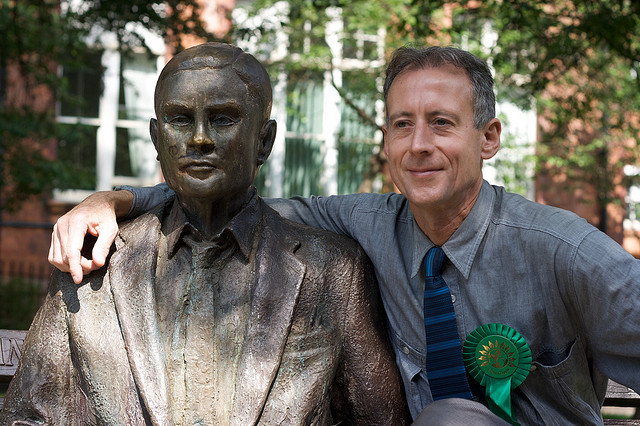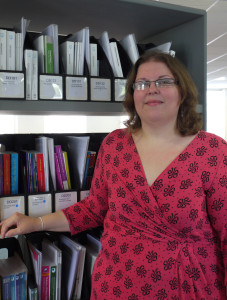Gay politicians will only achieve equality when their sexuality is no longer deemed newsworthy
Press coverage of British politicians’ sexuality has been marked by homophobic sentiment. In this post Donna Smith shares findings from her research from over three decades of media coverage, charting the way in which the discussion of sexuality has changed to reflect societal attitudes. But she warns that genuine equality will only be achieved when a politicians’ sexuality ceases to become an issue.

Gay rights campaigner Peter Tatchell with a statue of Alan Turing in Manchester. Credit: Peter Birkinshaw (CC BY 2.0)
There have been many gay politicians in UK politics over the years, some ‘out’ to the press, and some not. Many gay politicians have had their political careers end in disaster because the press has accused them of lying about their sexuality, or they have been caught up in some sort of scandal. Resignation, humiliation and disappointment often followed a public ‘outing’, and whether or not the politician concerned did lie, it is difficult not to feel sympathy for those caught in the eye of the storm.
We can of course debate whether or not a gay politician should ever have to ‘come out’ to the press (surely we only have equality, or as close to it as we can get, when it’s not a big deal?), but the fact is the press deems someone ‘in’ the closet if they haven’t talked about or at least made their homosexuality known in the public eye.
In my book Sex, Lies and Politics: Gay Politicians in the Press, I track how the newspaper representation of gay politicians has changed over the years, starting from pre-1980, when sensational articles dominated coverage, often as the result of a ‘scandalous’ court case. This was true of representation in the 1950s when homosexuality had yet to be decriminalised and public disapproval was high, but of later decades too after homosexuality had been legalised.
As the 1980s approached press coverage of gay politicians began to improve, echoing the improved legal status of homosexuality and more relaxed public attitudes, but a dominant heterosexuality still coloured the press coverage of gay politicians. So, while the 1980s saw Chris Smith’s ‘self-outing’ in 1984, demonstrating that ‘openly’ gay politicians could now survive politically, it also saw Peter Tatchell’s very negative campaigning experience in the 1983 Bermondsey by-election. However, in the mid-1980s there was a regression in public opinion, with people more intolerant of homosexuality than in the early 1980s, linked to the emergence of HIV/AIDS, something which affected press representation of gay politicians.
While the language used to describe gay politicians became more moderate towards the mid-1990s, especially in the broadsheet newspapers (echoing – and influencing – public opinion), politicians such as Michael Brown were still being ‘outed’ by tabloid newspapers, with the sensationalist tone and stereotypical language used by many newspapers (particularly the tabloids) still considered unsatisfactory by many gay activists. It is perhaps unsurprising that Smith remained the only ‘self-outed’ gay MP at this time, with the ‘outing’ of numerous ‘sleazy’ and ‘untrustworthy’ Conservative MPs contributing towards a fevered atmosphere surrounding the personal lives of politicians.
The positive reaction of the press to the election of openly gay politicians in 1997 suggested that gay politicians would no longer have to hide their sexuality in order to get ahead in politics (in fact, it could be a plus point), something emphasised by the promotion of gay men and woman to ministerial posts. However, soon after various gay politicians were ‘outed’ by tabloid newspapers, with stereotypes and discriminatory language utilised, and the public interest criteria of the Press Complaints Commission (PCC) disregarded. While many political commentators felt that tabloid newspapers such as The Sun went too far in their press coverage, other tabloid newspapers, and broadsheet newspapers too, covered the ‘outings’.
While on the surface the press representation of gay MPs has improved, and in the 2000s the representation of ‘scandalous’ gay politicians increasingly echoes the representation of heterosexual politicians caught up in a scandal (with non-scandalous gay MPs not receiving much attention at all), the portrayal of gay MPs and homosexuality as a whole can still have murky undertones. The fact that in 2006 “LIB DEMS IN CRISIS OVER GAY SEX SHAME” (Daily Express) and “A SECOND LIMP-DEM CONFESSES: I’M GAY TOO” (The Sun) were deemed acceptable tabloid headlines says it all.
Shockingly, my research has revealed that the last time a gay politician was called a ‘poofter’ in the national press was 2001, and described as ‘mincing’ in 2003. Even in recent years, MPs who have ‘come out’ have found themselves the centre of attention; the homosexuality of Crispin Blunt and Nigel Evans, for example, who both ‘came out’ in 2010, was still deemed a newsworthy issue, however limited that newsworthiness was compared to the press coverage of earlier politicians.
Looking back at some newspaper articles it may appear shocking to younger readers than many of the articles were ever published. No matter how much attention the contemporary press may pay a politician who has ‘come out’, a headline like “SIXTY-FIVE MPS ARE POOFTERS (REVEALS ONE WHO IS)” (The Sun, in 1987) will certainly never be published again.
‘Lax’ (or at least ‘relaxed’) press regulation can be considered one of the things that made articles about political private lives possible. The UK press is (still, despite the Leveson enquiry) currently and historically self-regulated, with the industry body, (at the moment) the PCC, reacting to rather than preventing press intrusion. Self-regulation can be seen as a weak way of keeping the press in check; when in 1990 The Sun was criticised by the Press Council (predecessor to the PCC) for homophobia, its reaction was bullish:
We know a great deal more about how ordinary people think, act and speak. Readers of The Sun KNOW and SPEAK and WRITE words like poof and poofter. What is good enough for them is good enough for us. Incidentally, our dictionary defines gay as carefree, merry, brilliant. Does the Press Council approve of homosexuals appropriating such a fine old word?
Ouch!
The effectiveness of post-Leveson plans for press regulation (whether a body overseen by the Government’s Royal Charter, or the industry’s proposed new self-regulatory body), is certainly something to keep an eye on. Will either prevent intrusions into the private lives of gay politicians? And, of course, to what extent should they? After all, it can be argued that some gay politicians who have found themselves on front pages have lied about their lives, made hypocritical statements or done things that are illegal, and the press has exposed the truth. Whatever happens, the rabid headlines of the 1980s and 1990s are relics of the past, and even the front pages of the 2000s appear hugely out of date.
For the last few years I have sensed the tide is turning. Apart from the above-mentioned lack of fuss in recent years when MPs have been ‘outed’, public opinion about homosexuality has improved significantly since the mid-2000s, David Cameron’s leadership of the Conservatives ushered in a calmer and fairer approach to gay rights in that party, and the tone of media depictions has generally improved too. All of this indicates that representation will continue to improve – but we still have to wait for being gay not to be newsworthy before gay MPs receive truly equal representation.
—
Note: This post represents the views of the author, and does not necessarily give the position of Democratic Audit or the LSE. Please read our comments policy before commenting. Shortlink for this post: buff.ly/1kNQDg6
—
 Dr Donna Smith is a Senior Faculty Manager, Faculty of Social Sciences, at the Open University, as well as an Associate Lecturer in Politics and Social Sciences. She completed her PhD at the Open University in 2009, after working in Westminster politics. Her BA (Hons) and MA were studied at the University of East Anglia. Her book Sex, Lies and Politics: Gay Politicians in the Press was published in 2012 (hardback) and 2013 (paperback) by Sussex Academic Press, and featured on the BBC News website.
Dr Donna Smith is a Senior Faculty Manager, Faculty of Social Sciences, at the Open University, as well as an Associate Lecturer in Politics and Social Sciences. She completed her PhD at the Open University in 2009, after working in Westminster politics. Her BA (Hons) and MA were studied at the University of East Anglia. Her book Sex, Lies and Politics: Gay Politicians in the Press was published in 2012 (hardback) and 2013 (paperback) by Sussex Academic Press, and featured on the BBC News website.





 Democratic Audit's core funding is provided by the Joseph Rowntree Charitable Trust. Additional funding is provided by the London School of Economics.
Democratic Audit's core funding is provided by the Joseph Rowntree Charitable Trust. Additional funding is provided by the London School of Economics.
sac kelly hermes pas cher
Everyone loves what you guys tend to be up too. This type of clever work and exposure! Keep up the superb works guys I’ve incorporated you guys to our blogroll.|
锘縧ouis vuitton speedy
I’m really impressed with your writing abilities as smartly as with the format for your blog. Is this a paid subject matter or did you modify it yourself? Anyway stay up the excellent quality writing, it is uncommon to peer a nice blog like this one t…
Gay politicians, newspapers, and equality – read all about it via @democraticaudit https://t.co/S6L5zsPeVF
RT @democraticaudit: From attacks on @PeterTatchell in 1983 to the post-Leveson age – how has media reaction to gay politicians changed? ht…
Clegg tells @GayTimesMag gay PM would be no big deal. Untrue, suggests analysis of media reaction to gay politicians: https://t.co/25yFyvs7zi
When will gay politicians be treated as equals? Donna Smith on the British media @AttitudeMag https://t.co/32nVoP3oia
New on Democratic Audit today: @Dr_DonnaSmith on the recent history of media coverage of gay politicians https://t.co/QTn2ozeOGW
Gay politicians will only achieve equality when their sexuality is no longer deemed newsworthy https://t.co/3fijONtzxr
Gay politicians will only achieve equality when their sexuality is no longer deemed newsworthy https://t.co/cbWM6BE6Zv